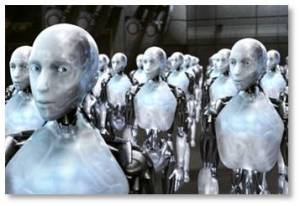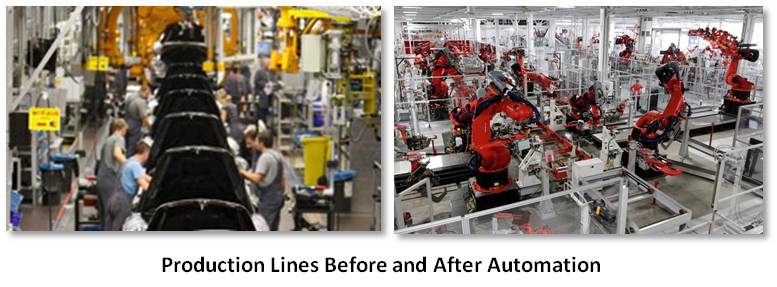Automating the Workplace
Related post: A Dangerous Mind on Labor Force Participation
This morning’s Wall Street Journal has an op-ed article “Countering Tech’s Damaging Effect on Jobs” by William A. Galston that discusses the impact on the American economy of automating jobs.
Mr. Galston notes a report in The Economist that, “assembles an impressive array of evidence for the proposition that advances in information and communications technology are destroying more jobs in advanced economies than the advances are creating.” And the trend appears to be increasing. Mr. Galston’s solution is a set of government solutions that include wage subsidies and work-sharing programs.
I disagree. If the free market works the way it’s supposed to, then none of that is necessary. Things will change when companies begin to understand that robots don’t buy anything. Picture a factory filled with robots and other automated devices. It produces its products quickly and efficiently, which should improve the company’s profits. Except that the boxes pile up on the shipping dock because there is no market left. The products either don’t sell or they are sold to very few people. Why? Because robots don’t buy anything.
Granted, there may still be enough people with jobs to afford to purchase some of the company’s products but nowhere near as many as if a robust middle class filled the stores. Unemployed or underemployed people spend money only on the necessities, after all—and sometimes not all of those.
Supply Without Demand
At some point, American business will wake up and realize that production is only part of the supply-and demand equation. Supply doesn’t matter if there’s no demand. And robots don’t buy anything.
The problem also lies with executives who look at business one company, one product, one industry at a time. But it’s all related. An employee at company A purchases products made by Company K and Company Q, and Company Z. He or she also eats in restaurants, gets a haircut, takes a yoga class, joins a gym, stays at a B&B, goes to a movie etc., all of which employ other people. Robots don’t do any of those things.
We’re all in this economy together. The question really is: why is this not happening?



Aline:
Not sure if you’ve seen this, but…
http://www.theatlantic.com/business/archive/2014/12/millennials-arent-saving-money-because-theyre-not-making-money/383338/
As I pointed out in my essay:
http://davidhuntpe.wordpress.com/2014/12/01/future-shock/
An economy needs disposable income to grow and thrive. As your, and this, article point out – that’s not happening.